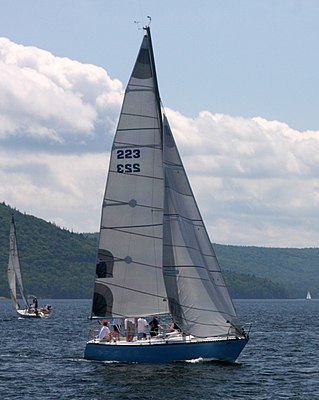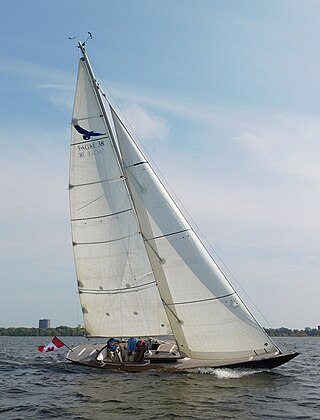Related Research Articles

The Tartan Ten, also called the Tartan 10, is an American sailboat that was designed by Sparkman & Stephens as a one-design racer and first built in 1978.
The Hobie 33 is an American trailerable sailboat that was designed by Hobie Alter and Phil Edwards as one-design racer and first built in 1982. It was the first monohull design for Alter and his company, after establishing their reputations for their lines of surfboards and catamarans
The C&C SR 33 is a racing sailboat that was designed by Glenn Henderson and first built in 1992.
The Hunter 290 is an American sailboat that was designed by the Hunter Design Team as a cruising boat and first built in 1999.
The Marlow-Hunter 50 is an American sailboat that was designed by the Hunter Design Team as a cruiser and first built in 2010.
The Marlow-Hunter 50 Center Cockpit, also called the Marlow-Hunter 50CC is an American sailboat that was designed by the Hunter Design Team as a cruiser and first built in 2010.
The Marlow-Hunter 42SS is an American sailboat that was designed by the Hunter Design Team as a cruiser and first built in 2016.
The Seidelmann 245 is an American trailerable sailboat that was designed by Bob Seidelmann as a cruiser and first built in 1981. The designer was well known as a champion one design sailor and also as a sailmaker.
The Merit 25 is an American trailerable sailboat that was designed by Paul Yates as a Midget Ocean Racing Club (MORC) racer and first built in 1978.
The Freedom 25 is an American sailboat that was designed by Gary Hoyt as a single-handed racer-cruiser and first built in 1980.
The Island Packet 35 is an American sailboat that was designed by Robert K. Johnson as a cruiser and first built in 1988.
The Catalina 375 is an American sailboat that was designed by Gerry Douglas as a cruiser and first built in 2008.
The Cape Dory 33 is an American sailboat that was designed by Carl Alberg as cruiser and first built in 1980.
The DB-1 is a West German sailboat that was designed by E. G. van de Stadt and Cees van Tongeren as an International Offshore Rule Three-Quarter Ton class racer and first built in 1980.
The DB-2 is a West German sailboat that was designed by E. G. van de Stadt and Cees van Tongeren as an International Offshore Rule Three-Quarter Ton class racer and first built in 1981.
The Freedom 35 is an American sailboat that was designed by David Pedrick as a racer/cruiser and first built in 1993.
The Alajuela 33 is an American sailboat that was designed by Raymond Richards for cruising and first built in 1977.
The Islander 40 is an American sailboat that was designed by Doug Peterson as a racer-cruiser and first built in 1979.
The Irwin 41 is an American sailboat that was designed by Ted Irwin as a cruiser and first built in 1982.

The Eagle 38 is a Dutch sailboat that was designed by Hoek Design as a day sailer and first built in 2019.
References
- 1 2 3 4 5 McArthur, Bruce (2019). "San Juan 33S sailboat". sailboatdata.com. Archived from the original on 12 April 2022. Retrieved 8 December 2019.
- ↑ McArthur, Bruce (2019). "David Pedrick". sailboatdata.com. Archived from the original on 12 April 2022. Retrieved 8 December 2019.
- 1 2 3 4 5 6 7 8 Sherwood, Richard M.: A Field Guide to Sailboats of North America, Second Edition, pages 258-259. Houghton Mifflin Company, 1994. ISBN 0-395-65239-1
- ↑ Browning, Randy (2019). "Clark Boat Company 1960-1984". sailboatdata.com. Archived from the original on 10 April 2023. Retrieved 8 December 2019.